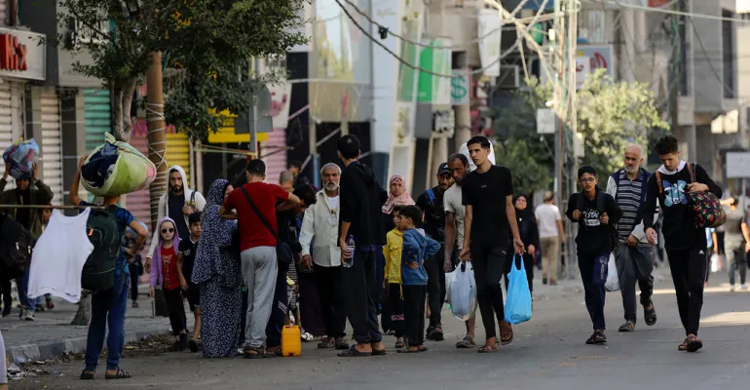Thousands of Palestinians flee northern Gaza in ‘desperate journey’

Thousands of Palestinians have left northern Gaza on foot, waving white flags and moving southwards in search of refuge that has become increasingly elusive as Israel pounds the entire enclave with air strikes.
The United Nations said on Wednesday that 15,000 Palestinians had fled northern Gaza the day before, using the main traffic artery, Salah al-Din Road. This was three times the figure estimated on Monday.
The Israeli military gave residents of northern Gaza a four-hour window to leave on Wednesday.
“It’s difficult to get information for an ongoing military operation, but people we’re speaking to in Gaza say they’re seeing Israeli troops setting up positions and posts in buildings nearby,” Al Jazeera’s Alan Fisher said.
“At the same time, we’re seeing thousands of people moving south – not car convoys. They’re walking. They’re waving white flags, fearing being attacked. They’re moving together in large groups – believing there could be some safety in numbers – in a desperate journey south to a future they have no idea what it holds,” Fisher reported.
He cited the Israeli army as saying there were about 100,000 people left in the northern Gaza Strip, compared with the previous one million.
“The Israeli army says when it’s in Gaza this is all about ‘tightening the noose’ on Hamas, that it is going to target Hamas infrastructure and weapons facilities. It is going to hit as hard as it can any Hamas fighters they find.”
Israel said its ground forces have encircled Gaza City and are engaging in skirmishes with fighters from Palestinian groups. Palestinians say that no corner of the strip is safe from Israeli bombardment. More than 70 percent of Gaza’s 2.3 million residents have been displaced.
The majority – including children, the elderly and people with disabilities – have fled with minimal belongings. Some reported having to cross Israeli checkpoints to reach the southern areas and witnessing arrests by Israeli forces.
“The majority of people have left their land because the [Israeli] siege has become absolute in Gaza. We have no water, no electricity and no flour,” Ameer Ghalban, pushing an elderly wheelchair-bound relative down Gaza’s main road, told The Associated Press news agency.
“We were sitting in peace when all of a sudden an F-16 air strike landed on a house and blew it up, the entire block, three houses next to each other,” Mohammed Abu Daqa, a witness to an Israeli air strike in Khan Younis in southern Gaza, told AP.
“Civilians, all of them civilians. An old woman, an old man and there are others still missing under the rubble.”
More than 10,569 people have been killed in Israel’s relentless bombardment, including 4,324 children, according to Gaza’s Ministry of Health.
The war broke out on October 7 when Hamas launched attacks on southern Israel that authorities there said killed more than 1,400 people.
The displacement in Gaza, where the majority of the population are refugees with parents or grandparents who were forcibly expelled from their homes and barred from returning during the founding of Israel in 1948, have reignited a painful sense of deja vu.
“We cannot find food, and there is no flour. People are waiting in long queues for water,” Umm Moamen al-Arja, a mother sheltering in southern Gaza, told Al Jazeera.
“We just want to return to our homes and reunite with our families.”
Source: Al Jazeera and news agencies

